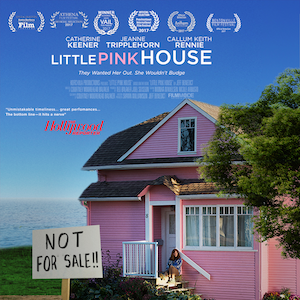 A very important film is in limited release currently, and it is worth seeing for the important case of government abuse and it highlights the heroism of those who fought the good fight. LITTLE PINK HOUSE is based on the true story told in the book Little Pink House: A True Story of Defiance and Courage by Jeff Benedict.
A very important film is in limited release currently, and it is worth seeing for the important case of government abuse and it highlights the heroism of those who fought the good fight. LITTLE PINK HOUSE is based on the true story told in the book Little Pink House: A True Story of Defiance and Courage by Jeff Benedict.
Susette Kelo (wonderfully played by Catherine Keener) was a woman who was winding down her second marriage, and she bought a run-down house and made it into her dream home. It wasn’t glamorous, but it was modest and had a nice view. And it was HERS. She put a lot of work into it and was proud of what she had accomplished. She was living her American Dream – working hard, saving, taking care of yourself and making a good life for yourself.
The Fort Trumbull area was not a garden spot – it was a working class area. There was a dilapidated state park and there was a sewage treatment plant. The neighborhood was filled with many elderly and people of modest means. As you hear again and again in the movie and book, many of the residents were born there, and many husbands and wives and parents had spent their whole lives there and they wanted to die there.
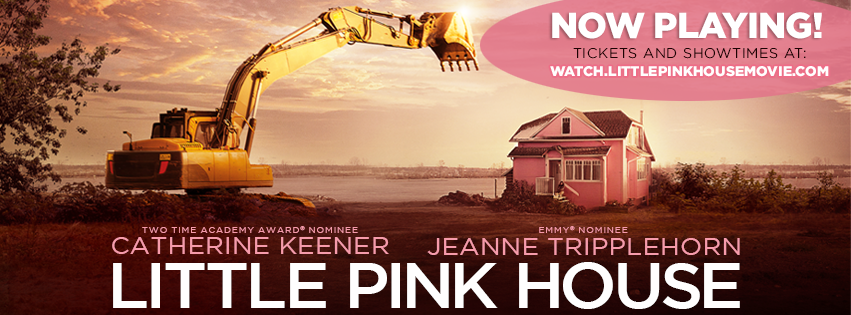
Life was good. Then – the government got their grubby hands into it. The Republican Governor John Rowland (played by Aaron Douglas) was looking to make a positive impression in an economically under-performing Democratic community, New London, Connecticut. He saw an opportunity for redevelopment. He and his chief of staff select a surrogate, New London civic leader “Charlotte Wells” (played by Jeanne Tripplehorn). She brings into the equation the president of Pfizer Pharmaceuticals who just happens to have a brand new product. Yes, the movie goer is treated to a short version of a commercial for a “little blue pill” (Viagra) which will enlarge many things, including their business, bottom line and need for additional office and research space.
Note that many of the characters identified do not have their real names in the movie. “Charlotte Wells” is actually Dr. Claire Gaudiani, who was president of the New London Development Corporation (NLDC) and also president of Connecticut College. I am assuming this is to avoid lawsuits about their portrayals on the big screen. Some of the “behind the scenes” actions of the “bad guys” are unknown, so individual acts of evil can only be guessed. But their ultimate evil ends which are inflicted upon the residents of Fort Trumbull were VERY REAL.
Susette Kelo and her fellow “good guys” can, of course, be named. There is a property and store owner Billy Von Winkle (played by Colin Cunningham) and antique dealer/second-hand store owner Tim Leblanc (nicely played by Callum Keith Rennie) who eventually becomes involved with Susette. They lead a normal life until they start hearing about the plans for change in Fort Trumbull. When they start hearing about eminent domain, a “trailer” that was played for “Little Pink House at the Anthem Film Festival Trailer” has a good clip from the movie about how this was an outrageous abuse of Eminent Domain – it was not for a “public good” but simply a taking for another private party (NLDC on behalf of Pfizer).
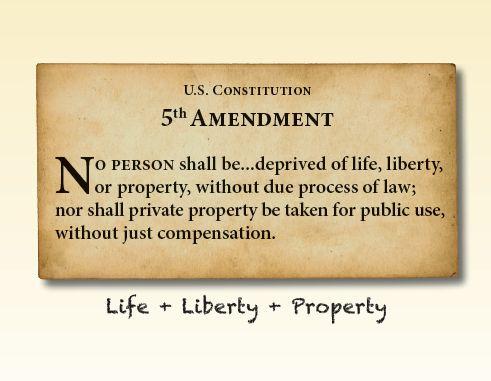 White Knight – The Institute for Justice
White Knight – The Institute for Justice
At this point Susette Kelo starts becoming an activists, and asks Lloyd Beachy (Garry Chalk), the mayor of New London, to help them. He brings in the Eminent Domain – a non-profit legal .foundation which works on behalf of issues involving free speech, economic liberty, educational choice, property rights and liberty. Here is a link to their information on the Kelo case: Kelo Eminent Domain – Institute for Justice. The lead attorney in the case is Scott Bullock (Giacomo Baessato), and some of the other “good guys” are Dana Berliner (Miranda Frigon) and IJ President Chip Mellor (Gardiner Millar). [NOTE: Institute for Justice also took on the Motel Caswell Civil Asset Forfeiture (IJ.org link) case from Tewksbury Massachusetts – and won!].
Well, not to give the whole movie away… They took the case to court, there was a “half win” (half the families keep their homes;half do not). A very much divided (4-3) State Supreme Court verdict, NOT in Kelo’s favor. And then, because there just happened to be a similar (with an opposite outcome) case in Detroit, their chances went from one in a hundred to – fifty-fifty. And thenoff they were to the Supreme Court.
There are many moving parts in the movie, that make you want to gasp in horror, and when, if you are an empathetic person, you want to cry for some of the tribulations Susette goes through. She is a reluctant activist, a plain spoken person who does not feel comfortable in the spotlight. And you should read the book – she is much more of a hero than the movie lets on. (I’m not putting the movie down at all – there are only so many things you can fit into a movie).
The movie covers about two thirds of the book. The remainder of the book tells further tales of struggles and heroism, of battling big and out of control government. About the activism undertaken by the Institute for Justice – part of their “Liberty in Action” efforts. It is summed up in some of the post script portions of the movie – about the 40+ states which have enacted laws to reign in Eminent Domain abuse (including New Hampshire; but excluding Connecticut).
I thoroughly enjoyed the movie. For my first viewing, because it was not in the Boston area, I went to Fort Trumbull, to the “scene of the crime.” It is still an empty lot, where a community had once stood. The Fort Trumbull State Park looks better than described, and you can see the views that were stolen from Susette Kelo. I took a few “souvenirs – a couple of brick fragments, a broken piece of pottery. Just a few artifacts from this tomb where some of our freedoms died. Then I went to the Kelo House – reconstructed by moving it board by board to a location roughly a mile away. Including the stone pillar with “NOT FOR SALE” carved into it!
The second time I saw it was in Cambridge, to help refresh my memory for writing this review. The only reason I mention this is that playing at the theater was the movie RBG – #RBGMovie – singing the praises of Ruth Bader Ginsburg. Ironic – on one theater screen, she is being lauded, and in the other, she was playing (in my mind) an agent of a major evil.
See the movie, and cheer. Read the book, and be motivated to become or continue on as an activist. All government abuses must be fought, and if citizens of the caliber of Susette Kelo continue to stand up, we can continue to attempt to reign in out-of-control government.
Normally reviewers are reluctant to give out “5 stars.” At a minimum it deserves 4.5 stars. Since the producers included a scene they idealized about where the disgraced governor was when he finds out the results of the Kelo verdict, I’m bumping it up to 5 stars. (you have to see the movie to find out what the reference is about).
Some other tidbits:
John Stossel has followed the case for years, and has a great case update and review: Stossel: Little Pink House – Reason.com. Link: LITTLE PINK HOUSE Official Trailer. The Kelo Case – several update videos from the Institute for Justice: Kelo: Five Years Later The Story of Susette Kelo Kelo and Its Aftermath: 10 Year Anniversary. From the Cato Institute: Kelo v. City of New London and The Kelo Decision Ten Years Later. A link about the movie being made: Reason.TV – Kelo Decision Coming to Big Screen in Little Pink House – YouTube. Link regarding the Kelo House on its current site: Historic Buildings of Connecticut » Blog Archive » The Kelo House (1890).
Reviews and news of Little Pink House – with pictures of Susette Kelo’s home where it should still be, but is not: Hartford Courant: George F. Will: Go See New London’s ‘Little Pink House‘ Mercury News: ‘Little Pink House’: The real story behind the movie USA Today: ‘Little Pink House’ eminent domain case deserves more attention Today show: This woman’s ‘Little Pink House’ was taken away by the government – TODAY.com
– Patrick Humphries – President of the Greater Boston Tea Party
Like this:
Like Loading...






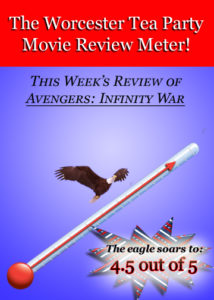



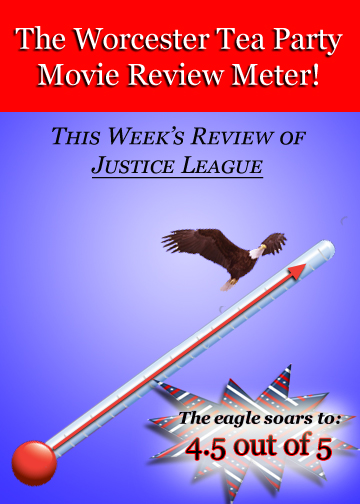
You must be logged in to post a comment.